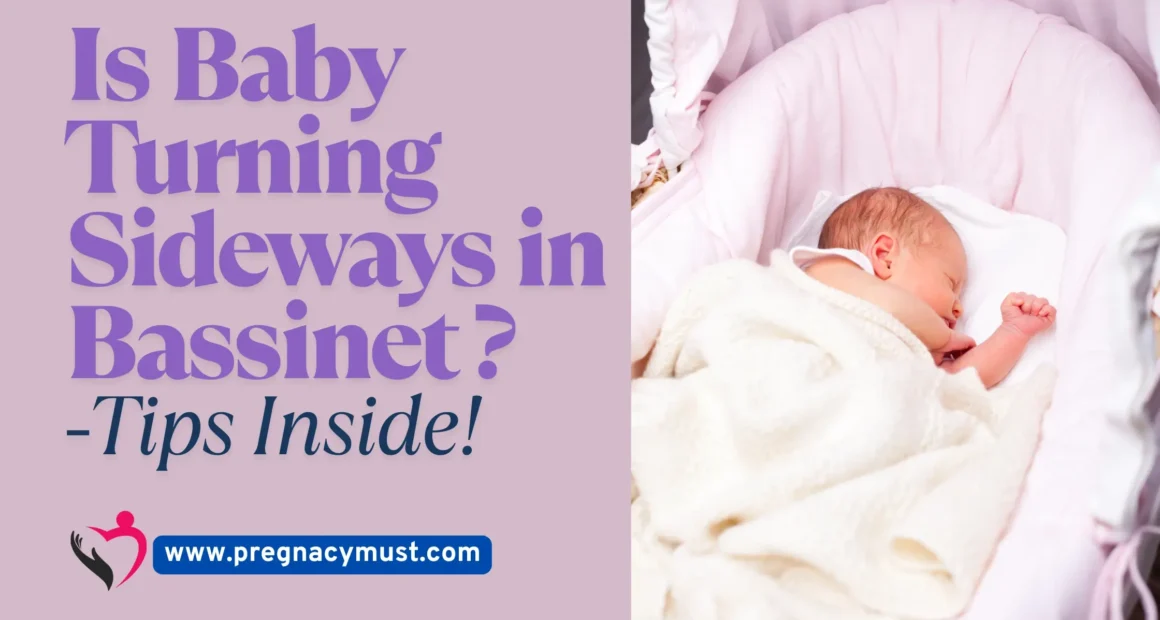It’s common to notice your baby turning sideways in bassinet during sleep, especially in the early months. Even though it may appear harmless, it arouses questions on sleep safety and comfort, as well as possible dangers. This article will tell you what it is, at what point you should worry, and what you can do to make your newborn sleep in the safest environment.
Table of Contents
Understanding Your Baby’s Sleep Movement
Babies are naturally active sleepers. In the initial months, it’s not uncommon for a newborn to roll on their side while sleeping, or even an infant who rolls on their side and gets stuck. Such movements may appear abrupt and sometimes form part of healthy development.
However, in case your baby is rolling over from side to side in bassinet, it is important to know the reasons and the necessary changes related to safe sleep.
Is Baby Turning Sideways in Bassinet a Concern?
In most cases, a baby turning sideways in bassinet isn’t dangerous, especially if your child can reposition themselves. But newborns have not-so-good motor skills and may have difficulties getting back, thus posing an increased risk of positional asphyxia or discomfort.
Here’s what parents often ask:
- Can newborns sleep on their side?
In general, medical personnel advise placing the babies in a back position to sleep because babies may roll onto their tummies while sleeping on their side.
- Can babies sleep on their side safely?
Back-sleeping should still be recommended, even if the child can roll both ways, e.g, from back to side, side to back, and if the side sleep can only be considered safer.
So, if your newborn rolls to side while sleeping, reposition them gently onto their back unless they are capable of independent movement.

Safe Sleep Guidelines for Rolling Infants on Side
To be safe when a baby is rotating sideways in a bassinet, follow these tips, which have been tested by experts:
Create a Safe Sleep Environment
- Don’t use a small or soft mattress; use a firm one that fits with a fitted sheet.
- Don’t use loose blankets or stuffed animals.
- Make sure that the bassinet is not in a slanted position.
Monitor Rolling Milestones
- If your newborn rolls to side, this might be a sign they’re developing strength.
- At about 4 months onward, most babies roll on purpose.
- Until they are able to roll both ways, always put your baby down to sleep on their back.
See our complete newborn swaddling guide for step-by-step instructions.
Advice to Handle Situation When Newborn Rolls to Side While Sleeping
Gently Reposition
If your newborn rolls to the side during sleep and hasn’t yet developed strong neck and back muscles, gently reposition them onto their back. Back-sleeping remains the safest position. Avoid relying on an infant side sleeper pillow unless recommended by a pediatrician, as such products may pose risks if misused.
Track Their Development
Frequent side rolling might be a sign your baby is approaching key motor milestones. Encourage daytime tummy time to strengthen muscles required for rolling and safe sleep transitions. Be cautious about using any infant anti roll pillow, as many are not recommended for unsupervised use during sleep.
Talk to Your Pediatrician
Discuss your baby’s sleep habits and side rolling behavior during checkups. If you’re concerned about how often they roll, your pediatrician can help assess the situation and may advise whether a side sleeper pillow for infants is appropriate—or suggest safer alternatives.
Final Thoughts on Baby Turning Sideways in Bassinet
Noticing your baby turning sideways in the bassinet can feel alarming, but it’s often a sign of healthy progress. Just make sure you’re following the latest safe sleep guidelines.
Until your baby can confidently roll both ways, stick to back-sleeping and maintain a clear sleep space—free of pillows, blankets, or toys. Avoid using a side sleeper pillow for infants or any infant anti roll pillow unless specifically directed by a healthcare provider.
Stay tuned with Pregnancy Must for parenting guidelines.








